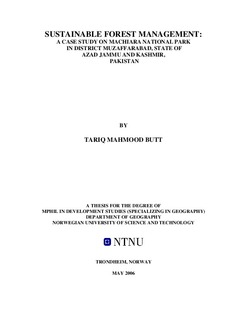| dc.description.abstract | Sustainable forest management and conservation in Azad Jammu and Kashmir, as in other developing states, has often been a source of conflict between the government and dependent communities. The forestry in the state has traditionally focused on maximization of revenue, hence other ecological services of forests have received less attention than wood production. This study focused on examining the degree of sustainability in the contemporary forest management within the Machiara National Park (MNP), besides uncovering existing conflicts among different actors over sustainable forest management. A qualitative research methodology was adopted, using semi-structured key informant interviews, in-depth individual and group interviews, discussions, observation and photographs. The respondent group comprised members of local forest communities, Forest Officers, project management and Ministers of the Forest and Wildlife Departments. Sustainable development and participatory development theories, landscape values approach and geographic concepts formed the basis for this study. This study reveals that the forest management in the MNP is alarmingly unsustainable and lacks popular participation. The present antiquated forest legislation and top-down command and control system support massive resource abuse. The momentum of the park interventions is much slower than expectations for a number of reasons. Poverty and ignorance coupled with disinformation are the apparent major causes of accelerated deforestation and encroachment.
This study reveals that the multiple administrations within the MNP forests are a major cause of sectoral conflict. The contractor mafia and corrupt junior foresters triggered anti-park wrath in the area. Economic policies and egocentric politics, besides inter-sectoral inconsistency, have accelerated the forest diminution and encroachment in the MNP. The study establishes that institutional inertia has undermined conservation efforts in the area and actors, responsible for the forest devastation within the MNP, will not change their attitude if the existing legal hitches and institutional inertia continue to prevail. The situation within the MNP calls for an urgent overhauling of the forest management system besides an efficient multi-sectoral intervention for sustainable livelihood provision and sustained reduction in the population growth and the rampant poverty. The Protected Areas Management Project in the MNP also needs to accelerate the pace of its interventions in the area. | nb_NO |
